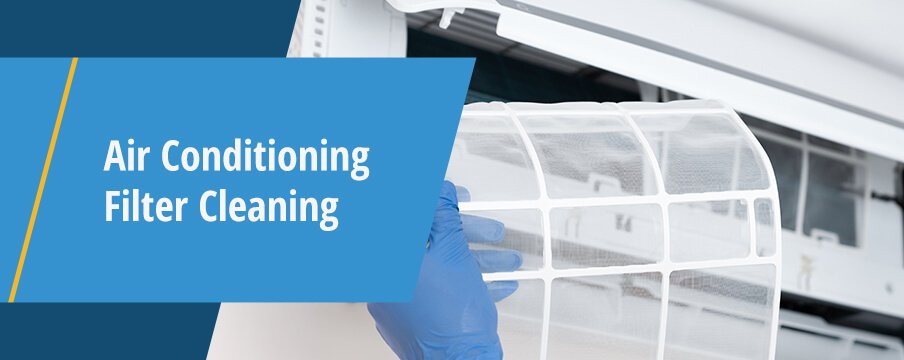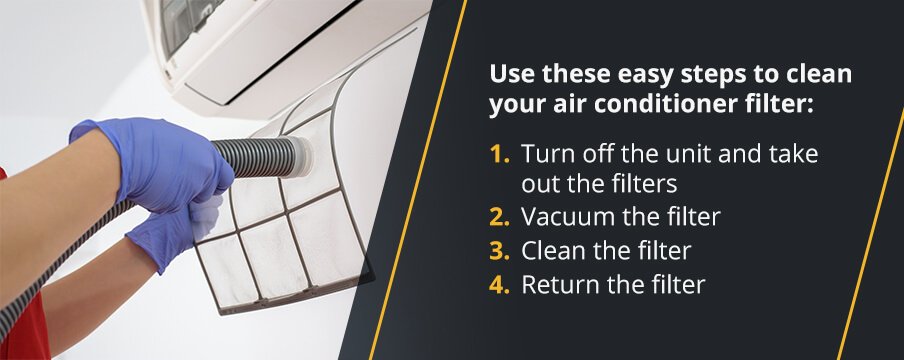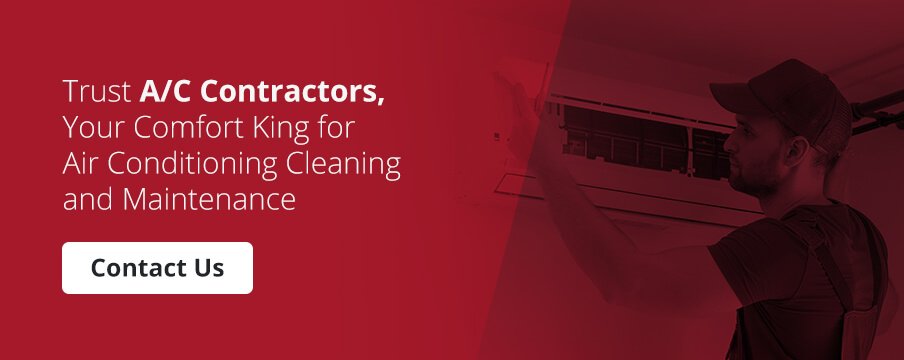A good air conditioning filter helps provide cool, clean air during hot periods. Because the filter catches debris, your air conditioner will need maintenance over time, and dirty air filters will need cleaning to help the unit run efficiently. Regular cleaning helps prevent bacteria, mold, dirt and dust from collecting in your unit, keeping your air quality excellent and your home cool. This guide will walk you through cleaning and maintaining your air conditioner filter.
Air Conditioning Filter Types
All filters require regular maintenance but have different durabilities and efficiencies. One filter rating is the Minimum Efficiency Reporting Values (MERV), which tells you how effective a filter is at catching particles between 0.3 and 10 microns. The higher the MERV rating, the better the filter traps larger particles. Some of the air filters you may come across include:
- Flat-paneled fiberglass filter: These disposable filters have fiberglass layers and a metal-reinforced grate for trapping debris. They have a low MERV rating and do little for air purification.
- Pleated media filter: These are other types of disposable filters for AC units. You’ll generally find these filters in a range of MERV ratings, and high-efficiency models go up to even higher ratings.
- Reusable air filters: Reusable filters are durable, more expensive options. Unlike disposable filters, you can clean, wash and reuse these filters, although their MERV is usually low. This means they are more susceptible to mold growth, so clean them regularly to avoid this.
- HEPA filter: High efficiency particulate air (HEPA) filters have the highest protection level of all air filters. HEPA filters potentially remove 99.97% of airborne particles with diameters of 0.3 microns. They have MERVs of 17 to 20 but aren’t usually available for residential systems without special modifications.
Air Conditioning Filter Removal and Installation
Clean air filters can lower a unit’s energy usage by 5%-15%, so removing and maintaining your filters is essential for improving your air conditioner’s air quality and cost-effectiveness. Perform filter removal and installation at home by following these steps:
- Find the AC unit: Before cleaning or replacing filters, find your unit and ensure you have the correct filter. Filters come in different sizes, so be sure yours is correct. AC units are in different spots depending on your HVAC system, but the filters are often behind the return vent. If you can’t find yours, you can call the manufacturer for help.
- Turn off the AC: Switch the unit off to prevent unfiltered air from flowing through the house. Once the system is off, carefully release the vent handle or unscrew the vent cover. Remove the existing filter to make room for the new one, and clean the grille with a microfiber cloth.
- Insert the filter: Following the arrows on the new filter and any instructions included, place the new filter inside. After this, you can close or re-screw the cover and turn the unit back on.
How Do You Clean an Air Conditioner Filter?
Keeping filters clean will improve airflow and quality in your house and increase your unit’s life span. You should also clean your air conditioner and have it tuned up yearly. Letting the AC system work dirty and putting off a tune-up can allow expensive problems and damages to occur, reducing your AC’s life and effectiveness.
Use these easy steps to clean your air conditioner filter:
- Turn off the unit and take out the filters: Once you’ve found the AC unit, turn it off so no air travels through your house. Open the unit with a screwdriver or remove the cover to get to the filter. Take out the filter and double-check to ensure you’ve found all the filters — some units have more than one.
- Vacuum the filter: Before beginning cleaning, read the owner’s manual to see if the filters should be cleaned or replaced. If there’s only dust and no grime on the filter, you can use your vacuum cleaner hose to clean the debris off.
- Clean the filter: If the filter has grime buildup or the vacuum isn’t removing the debris, use warm water to rinse the filter gently. With a weak stream, run the warm water through the filter in the direction of airflow to prevent damage. If the filter needs a deeper clean, fill a sink with one part white vinegar and one part warm water and let it soak for an hour or use an air conditioner filter cleaning spray. Rinse the filter off gently and let it dry.
- Return the filter: When the filter is clean and completely dry, you can put it back, replacing the cover and securing and screws you removed.
How Often Should I Clean My AC Filter?
Try to clean your filters around every month or two. Pets, heavy use and dusty conditions can dirty your filter faster, so clean more often if your AC is exposed to any of these situations. You should also clean out your AC unit regularly with condensed air to remove debris and dust buildup.
If your unit isn’t working well, it could be the filter. Dirty filters are one of the causes of common AC problems, so regular cleaning can help you avoid airflow-related issues. In addition to having your AC regularly looked at by a professional, you should clean your filters and unit at home if possible.
What Happens if You Don’t Clean Your Air Conditioner Filter?
Cleaning your air conditioning filter keeps the system running efficiently and allows you to get the maximum use out of your unit. Hiring technicians for preventative maintenance programs or getting an air conditioner filter cleaning service gives you the best possible return on your system. Regular maintenance, in addition to standard filter cleanings, helps prevent:
- Uneven cooling: Blocked air filters will cause hot and cold spots in your home, with uneven cooling throughout the house. You may spend more money on energy to compensate for the problem.
- Freezing: Dirt stops cold air from leaving the unit, trapping it inside the system. This can lower the internal temperature and eventually cause ice to form on the coils.
- Short-cycling: A working AC system cycles off and on during the day. Dirty filters can make the unit cycle more frequently, wasting energy, changing the temperature too often and creating noise disturbances.
- Debris and allergen buildup: Without a clean filter, allergens, debris and mold can build up inside your ducts. These particles can be released into your home, causing respiratory irritations for household members with allergies and asthma.
- Reduced efficiency: If your filter isn’t clean, your unit can’t function at its best efficiency. This burns energy, uses more power and increases your utility expenses unnecessarily.
Trust A/C Contractors, Your Comfort King for Air Conditioning Cleaning and Maintenance
The professional, Do-It-Right Guys at A/C Contractors will provide you with the expert AC services and tune-ups for your Longview and Tyler, Texas, home. If your AC goes down in the summer heat, our 24-hour emergency AC repair service will provide you with a prompt response and a comprehensive repair plan for your system.
Contact us today with questions about our free HVAC servicing estimates, flexible financing options and product and workmanship guarantees.


